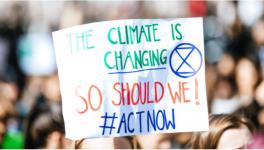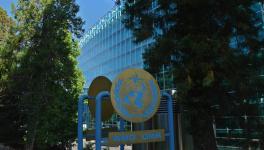Bad Climate Deal or No Deal: Countdown to Copenhagen
The global climate change negotiations are moving towards a total impasse with the rich, industrialised countries unwilling either to commit to deep and immediate cuts in their carbon emissions or make the required financial and technology transfers to the developing world. Instead, they are busy seeing how to split the ranks of the developing countries, create separate tracks de-linking their cuts from other measures and try and pass the burden of climate change to the rest of the world.
Closing Press Briefing, Barcelona Climate Change Talks 2009
The Barcelona deadlock
This is what led to 50 African nations boycotting the first day of the Barcelona talks. This is the final round of negotiations before the world heads to Copenhagen for the Climate Change Summit in early December. They had one and only one simple demand of the rich nations – start talking of the cuts you are willing to make before we take up anything else. All the cuts that the rich nations have made do not measure up to more than 11-18% below Kyoto benchmark of 1990 emissions, which is grossly insufficient to control climate change. And Africa, being the most vulnerable, is likely to face a climate catastrophe – with already high warming trends, droughts and floods. India is not likely to fare any better, with a 2% drop in agricultural production this year and rapid retreat of the Himalayan glaciers.
“On the one hand, you have richer nations that want to maintain profligate lifestyles, and nobody wants to change their habits, and they want us to remain poor by regulating our emissions and telling us we can’t industrialize,” said Alex Alusa, the climate change coordinator for the Kenyan Prime Minister, Raila Odinga. “That is not fair.” It is this anger that spilled into the negotiations in Barcelona.
The 70 other developing countries fully backed the African group of countries and finally, the rich nations caved in, agreeing to discuss their commitments first before other agenda items are taken up. However, the talks again foundered as the US, the biggest polluter, refused to put any numbers on the table. With the US Senate and the House of Representatives unlikely to pass any climate action bill this year, Copenhagen Summit appears to be a non-starter. In any case, the US is only considering 2005 as the base year for the cuts, unlike all other countries consider base year to be 1990. If we take 1990 as the base year, the cuts in the proposed Senate and House Bills add up to virtually a zero cut from 1990 as the US emissions have increased by 17% from 1990 to 2005..
Though the Minister for Environment and Forest, Jairam Ramesh has advocated a shift of India's position and distancing ourselves from the G77, fortunately the Indian negotiating team's position has not changed as yet. India stuck with the G77 and the African block. It is clearly the G77, India and China that spoke up for the world, with rich countries opposing any real action.
Continuing grab of global carbon space
The rich, industrialised countries do not want to talk about a per capita convergence approach in the climate change negotiations. This means not only forgetting that the rich countries have already hogged most of the carbon budget, but also allowing them to grab the major part of what is left from the future share of the developing countries.
The figures coming from various studies make clear that the rich countries will have to make deep and immediate cuts and with the major part of the carbon space already gone, the emerging economies and the rest of the world will also have to peak their emissions at some future date. The later and shallower the cut that the rich countries undertake, the rest of the world have to peak earlier and make even deeper cuts. The current climate change negotiations therefore is about dividing up the remaining space equitably and also compensating the developing countries for the disproportionate share of the global atmospheric commons that the rich countries have already grabbed. This was the basis of the Kyoto Protocol and this is what the developed world lead by the US wants to negotiate out of Copenhagen.
The US proposal is quite simple. If we cut through the verbiage that accompanies such negotiations, they are proposing that there be no difference between Annex 1 countries, the ones who have historically caused the problem and the non-Annex 1who are suffering from its consequences. Each should make commitments, which will be monitored and verified independently. Secondly, the financial transfers on the table for the developing countries being forced to follow a low-carbon path due to limited carbon space are negligible. Instead of the $500 billion required per year as per UNFCC's calculations, the Europeans are committing about $2-15 billion. The bulk of the financing is proposed to come from either carbon trade – developing countries giving away their carbon space at throw-away prices and from the developing countries own internal budgets. The US has yet to make any commitments on this count. On technology transfers, the situation is even worse. The US Congress has forbidden the US negotiators to even discuss Intellectual Property Rights – this issue is not even on the table.
If the rich countries continue on a high carbon path to meet their luxury consumption, others will have to immediately go in for a low carbon emitting path to meet even their subsistence needs. If the rich countries do not vacate some carbon space by drastically reducing their emissions, every developing country will have to pay a very heavy price to save the globe.
Costs of a low carbon path
Just to put some numbers. A coal based plant can be put up for Rs. 5 crore per MW and will produce electricity with a 80% Plant Load Factor. Using a low carbon -- solar route -- the capital costs will be around Rs 20-25 crore per MW. But that is not all. Since the Plant Load Factor (PLF) is about 25% for solar plants – the sun does not shine at night -- we will have to install about 3-4 times as much capacity as a coal-fired plant to produce the same amount of electricity. The capital cost for producing the same amount of electricity using the solar route then is about 12-15 times that using the coal route or a high carbon route! So choosing a low carbon approach that allows the rich countries to continue with higher emissions will impose huge costs on the developing countries. That is why the fight for every bit of carbon space in the global negotiations.
The US is the only developed country that has not signed the Kyoto Protocol. It has as yet offered no concessions in the global negotiations. It is arguing that the world must tear up all its previous agreements: there is no global compact called Kyoto, no common but differentiated responsibility and no historical emissions. They have the lions' share of current stock of emissions and must continue to retain this share as the world cuts down on future emissions. The developed countries including the EU, after some initial noise, are slowly falling in behind the US.
Climate Action depends on the unity of developing countries
The developing countries unity is the key to the success of the Copenhagen negotiations. It is here that India can make or mar the global climate case. In GATT, it was India's about turn in 1989 on introducing Intellectual Property Rights (IPR) in trade negotiations that lead to the TRIPS and its devastating consequences on third world health costs. The talk of India's Security Council seat, it now being a part of G20, India's self-interest governing the climate change negotiations, all create suspicions of a similar about turn in Copenhagen. Hopefully, an active public opinion and an alert Parliament will not let that happen. Hopefully, the Indian Government now realises that it will stand totally isolated and be seen as a subordinate ally of the US if it does a GATT-like volte face.
We have two options in Copenhagen – a bad climate change treaty or extending the discussions and continuing with our exercise on the measures required to limit global warming. A bad climate change treaty in Copenhagen will be worst outcome of all – it will not save the world but will thwart development of the poorer countries.
The African countries have already shown that they are not going to be cowed down by the club of the rich. The voice of the developing countries will be heard. This is the message from Barcelona -- loud and clear. This is what India needs to reinforce.
Closing Press Briefing, Barcelona Climate Change Talks 2009
Get the latest reports & analysis with people's perspective on Protests, movements & deep analytical videos, discussions of the current affairs in your Telegram app. Subscribe to NewsClick's Telegram channel & get Real-Time updates on stories, as they get published on our website.























